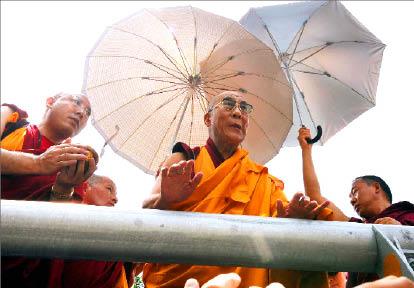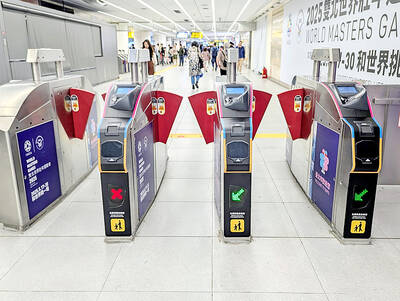President Ma Ying-jeou’s (馬英九) administration was concerned about the impact of a visit by the Dalai Lama in 2009 on its plans to begin negotiations with China on the Economic Cooperation Framework Agreement (ECFA) later the same year, a US cable released by WikiLeaks showed.
The Dalai Lama visited the country in August 2009 at the invitation of seven cities and counties in southern Taiwan to minister to victims of Typhoon Morakot, which had devastated parts of the south earlier that month.
Local government heads played down the political implications of his visit and the Dalai Lama did not meet Ma during his visit.

Photo: CNA
In a cable dated Sept. 2, 2009, Vice President Vincent Siew (蕭萬長) told American Institute in Taiwan (AIT) Director William Stanton during a meeting at Siew’s office that the administration was uncertain “if the Dalai Lama visit will delay the process [of cross-strait negotiations on the ECFA] or not.”
The Ma administration, seeking to facilitate bilateral trade talks with China and other economic partners, was worried that the Dalai Lama’s visit would affect the negotiations’ timetable, Stanton commented on Siew’s stance after the meeting.
In another cable dated Sept. 3, 2009, then-director of the Chinese Nationalist Party’s (KMT) Mainland Affairs Committee Chang Jung-kun (張榮恭) told Stanton at a meeting that the Dalai Lama’s trip could “damage” Beijing’s confidence in Ma.
Chang also said that to avoid confrontations with Beijing, the government persuaded the Dalai Lama to cancel a scheduled news briefing on Aug. 31 after he arrived in Taiwan, adding that then-KMT spokesman Lee Chien-jung (李建榮) even traveled to China to explain the move.
Chang’s comments revealed the reason behind the cancelation of the media conference originally scheduled in Kaohsiung.
At that time, Kaohsiung Mayor Chen Chu (陳菊) denied that she called off the news conference, and said Legislative Speaker Wang Jin-pyng (王金平) had suggested that the news conference should be canceled to avoid politicizing the visit.

A magnitude 6.4 earthquake struck off the coast of Hualien County in eastern Taiwan at 7pm yesterday, the Central Weather Administration (CWA) said. The epicenter of the temblor was at sea, about 69.9km south of Hualien County Hall, at a depth of 30.9km, it said. There were no immediate reports of damage resulting from the quake. The earthquake’s intensity, which gauges the actual effect of a temblor, was highest in Taitung County’s Changbin Township (長濱), where it measured 5 on Taiwan’s seven-tier intensity scale. The quake also measured an intensity of 4 in Hualien, Nantou, Chiayi, Yunlin, Changhua and Miaoli counties, as well as

Credit departments of farmers’ and fishers’ associations blocked a total of more than NT$180 million (US$6.01 million) from being lost to scams last year, National Police Agency (NPA) data showed. The Agricultural Finance Agency (AFA) said last week that staff of farmers’ and fishers’ associations’ credit departments are required to implement fraud prevention measures when they serve clients at the counter. They would ask clients about personal financial management activities whenever they suspect there might be a fraud situation, and would immediately report the incident to local authorities, which would send police officers to the site to help, it said. NPA data showed

ENERGY RESILIENCE: Although Alaska is open for investments, Taiwan is sourcing its gas from the Middle East, and the sea routes carry risks, Ho Cheng-hui said US government officials’ high-profile reception of a Taiwanese representative at the Alaska Sustainable Energy Conference indicated the emergence of an Indo-Pacific energy resilience alliance, an academic said. Presidential Office Secretary-General Pan Men-an (潘孟安) attended the conference in Alaska on Thursday last week at the invitation of the US government. Pan visited oil and gas facilities with senior US officials, including US Secretary of the Interior Doug Burgum, US Secretary of Energy Chris Wright, Alaska Governor Mike Dunleavy and US Senator Daniel Sullivan. Pan attending the conference on behalf of President William Lai (賴清德) shows a significant elevation in diplomatic representation,

The Taipei MRT is to begin accepting mobile payment services in the fall, Taipei Rapid Transit Corp said on Saturday. When the company finishes the installation of new payment units at ticketing gates in October, MRT passengers can use credit cards, Apple Pay, Google Pay and Samsung Pay, the operator said. In addition, the MRT would also provide QR payment codes — which would be compatible with Line Pay, Jkopay, iPass Money, PXPay Plus, EasyWallet, iCash Pay, Taiwan Pay and Taishin Pay — to access the railway system. Currently, passengers can access the Taipei MRT by buying a single-journey token or using EasyCard,